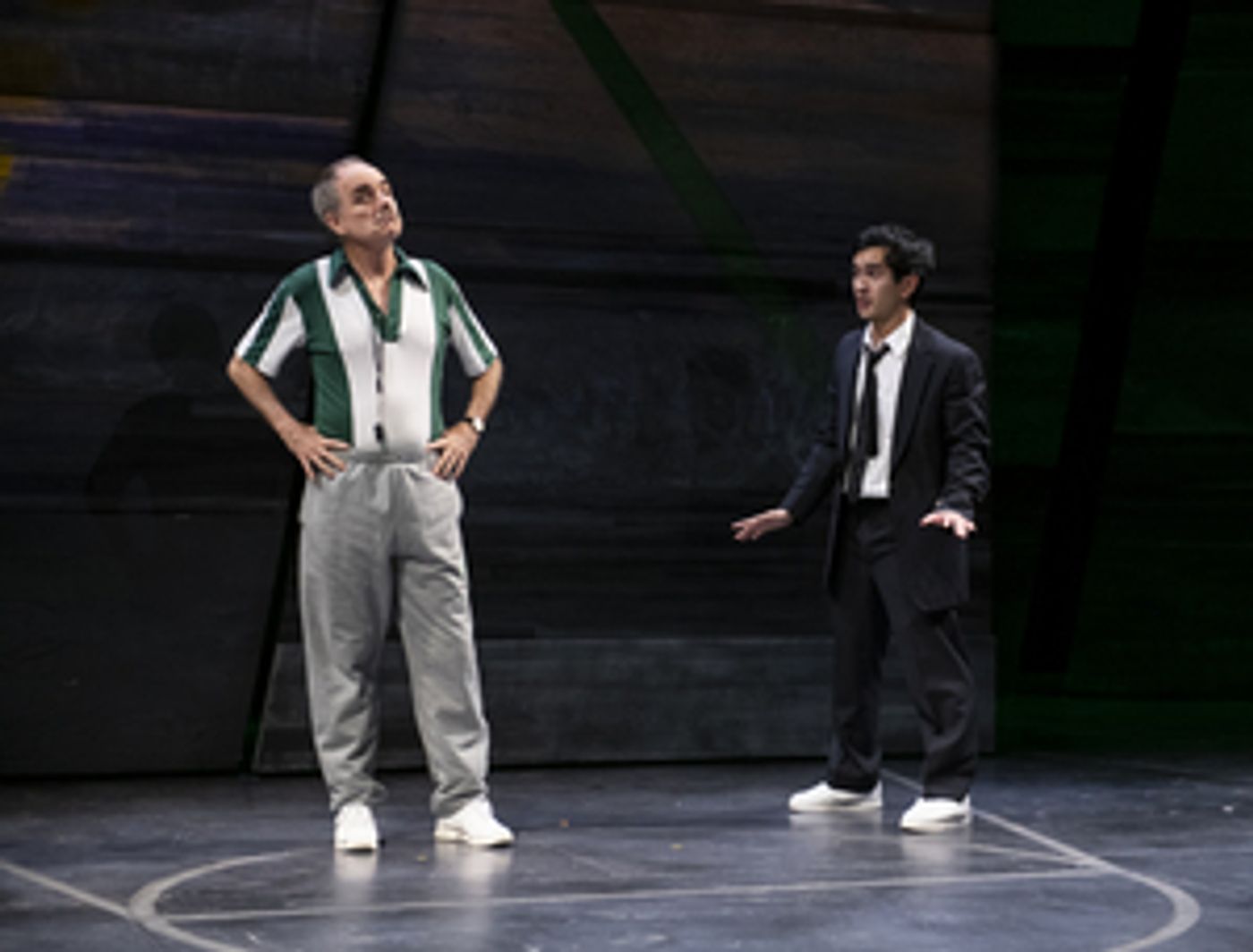Review: THE GREAT LEAP at Round House Theatre
This 'socio-political fable' about sports and Sino-American politics runs through Dec. 5.

Lauren Yee's play The Great Leap pushes hard on its basketball metaphors for U.S.-China affairs. But they might also be applied to the clever but somewhat contrived work itself in an animated new production directed by Jennifer Chang at Round House Theatre.
The first act sets a pick with the manic introduction of its cartoonishly drawn four characters. The year is 1989. Manford Lum (Randy Nguyen Ta) is a cocky motor-mouth 17-year-old San Francisco Chinatown basketball phenom trying to talk his way onto the USF team before it leaves for an exhibition game against Beijing University. Saul (Eric Hissom) is the foul-mouthed, casually racist college coach desperate to distract his bosses from the team's lousy record. Connie (Lois Shih) is Manford's 25-year-old quasi-guardian -- his mother has just died, and he doesn't know his dad. She tries to save the athletically gifted but impulsive kid from his own worst instincts. And Wen Chang (Grant Chang) is (in flashback to 1971) a basketball neophyte thrust into the role of coach for a Chinese team and briefly shown the ropes by the visiting Saul, who is all polyester, tough-talking, hair-tossing, ugly-American swagger.
That largely comical first-act pick leads to the second-act roll toward melodrama as the USF team comes to Beijing amid rising tensions in Tiananmen Square. The script is both made and unmade by its brassy ambition to reflect, via these four characters, Sino-American relations, the scripted but volatile role of sports diplomacy, the immigrant experience, the search for a lost father, the professional and personal salvation of two coaches, and the mystery behind a key historical moment.
Made, that is, because the plot drivers have the momentum of player X's and O's on a locker room strategy whiteboard. Unmade because that strategic plotting limits the degree to which we can emotionally connect to the characters as people as opposed to dramatic devices. Also because the story stretches circumstances and coincidences considerably beyond credibility. The play is billed as a "socio-politcal fable" inspired by the playwright's basketball-adoring father but also ostensibly rests on a historical foundation. However, Yee can't have it both ways -- fabulism and realism. Ultimately, those underpinnings don't fit together.
The work's seductive sheen, but also those deficiencies in construction, are cast in interesting relief by comparison to Lucy Kirkwood's less jaunty but more poignant 2013 play Chimerica, which deals, in a headier Stoppardesque manner, with some of the same events and themes through the lens of photojournalism.
Nonetheless, Round House's Great Leap performances are energetic. Ta is an amusingly manic Manford with a small-but-mighty build and attitude appropriate to a street-ball standout. He doesn't read books, he says at one point, but he's got smarts to spare, seeing right through Coach Saul.
The character of Saul, even more than the rest of the script, is drawn with a Sharpie. He's obnoxious to the point of sitcom overkill. There are moments when Hissom does what he can to add some haggard give-me-a break shading to the part. "I let the game get bigger than the rest of my life," he laments in a flash of vulnerability. But for the most part Hissom fills out the part's caricatured contours with vulgar mannerisms. They get laughs, but they get old.
As Connie, Shih is endearing as she tries to speak to Manford in the language of his crackling adolescent enthusiasms while also vigilantly checking out Saul's probity and intentions. Grant Chang, as Wen Chang, chillingly renders his transformation from young, clueless coaching newbie to cagey, somber Party functionary.
The production is visually satisfying. Scenic designer Tony Cisek backs rotating stage components with grand walls, moodily lit by Minjoo Kim, and with projections by Jason H. Thompson and Kaitlyn Pietras. Those walls evoke both guarded personas and monolithic regimes. After all, in politics and in sport, "there is no such thing," in Manford's words, "as a friendship game."
**
Run time: 2 hours, including a 15-minute intermission. More information and tickets are available here.
Reader Reviews
Videos

